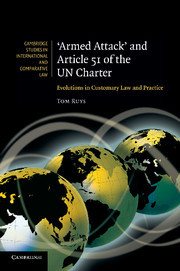Description
'Armed Attack' and Article 51 of the UN Charter
Evolutions in Customary Law and Practice
Cambridge Studies in International and Comparative Law Series
Author: Ruys Tom
An examination of the scope of States' right of self-defence under Article 51 of the UN Charter in the post-9/11 security environment.
Language: English
Subject for 'Armed Attack' and Article 51 of the UN Charter:
'Armed Attack' and Article 51 of the UN Charter
Publication date: 10-2013
Support: Print on demand
Publication date: 10-2013
Support: Print on demand
'Armed Attack' and Article 51 of the UN Charter
Publication date: 11-2010
616 p. · 15.2x22.9 cm · Hardback
Publication date: 11-2010
616 p. · 15.2x22.9 cm · Hardback
Description
/li>Contents
/li>Biography
/li>
This book examines to what extent the right of self-defence, as laid down in Article 51 of the Charter of the United Nations, permits States to launch military operations against other States. In particular, it focuses on the occurrence of an 'armed attack' - the crucial trigger for the activation of this right. In light of the developments since 9/11, the author analyses relevant physical and verbal customary practice, ranging from the 1974 Definition of Aggression to recent incidents such as the 2001 US intervention in Afghanistan and the 2006 Israeli intervention in Lebanon. The notion of 'armed attack' is examined from a threefold perspective. What acts can be regarded as an 'armed attack'? When can an 'armed attack' be considered to take place? And from whom must an 'armed attack' emanate? By way of conclusion, the different findings are brought together in a draft 'Definition of Armed Attack'.
Introduction; 1. The methodological debate and the quest for custom; 2. Conditions of self-defence; 3. The Armed Attack Requirement Ratione Materiae; 4. The Armed Attack Requirement Ratione Temporis; 5. The Armed Attack Requirement Ratione Personae; 6. What future for the armed attack criterion?
Dr Tom Ruys is a lawyer with Stibbe, Brussels, and a senior member of the Leuven Centre for Global Governance Studies. He also teaches public international law and humanitarian and security law as a substitute lecturer at the Catholic University of Leuven.
© 2024 LAVOISIER S.A.S.




